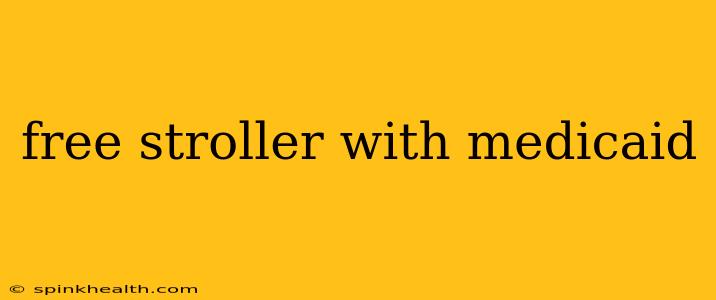Navigating the World of Free Strollers and Medicaid: A Parent's Guide
Becoming a parent is a joyous occasion, but it's also a time filled with many financial considerations. The cost of baby essentials, like a stroller, can feel overwhelming, especially for families relying on Medicaid. So, the question many parents ask is: Can I get a free stroller with Medicaid? The short answer is, it's not a straightforward "yes" or "no." Let's unpack the complexities and explore the pathways available to families seeking assistance.
My journey as a social worker has exposed me to countless families struggling to meet their basic needs. I've witnessed firsthand the stress of affording necessities, and the relief when families find support. This guide aims to provide practical information and resources for parents seeking assistance with obtaining a stroller.
Can Medicaid Directly Provide a Free Stroller?
Medicaid's primary focus is on healthcare coverage. It generally doesn't directly provide non-medical items like strollers. However, Medicaid recipients can access other programs and resources that might indirectly help acquire one. This opens a path towards securing a free or heavily subsidized stroller.
What Programs Might Offer Assistance?
Several programs across the country offer assistance to families in need. These programs often depend on your state's specific policies and available funding.
-
WIC (Women, Infants, and Children): While primarily known for providing nutritious food, some WIC programs offer additional resources or referrals to organizations providing baby equipment assistance. It's worth checking with your local WIC office to see what additional resources are available in your area.
-
Local Charities and Non-Profits: Many community organizations, churches, and non-profit groups offer assistance programs for families in need. They frequently accept donations of gently used strollers and distribute them to families who qualify based on income and need. Searching online for "baby equipment assistance [your city/state]" will likely reveal several local resources.
-
Hospital Social Workers: Hospitals often have social workers dedicated to assisting new parents. These professionals can provide valuable referrals to community resources that can help secure a free or low-cost stroller. Don't hesitate to reach out to your hospital's social services department during or after your delivery.
How Can I Find a Used Stroller?
Buying a used stroller is a cost-effective alternative to purchasing a new one. Several avenues exist to find gently used strollers in excellent condition:
-
Online Classifieds: Websites like Craigslist, Facebook Marketplace, and Nextdoor are excellent places to find used strollers at significantly reduced prices. Be sure to inspect the stroller carefully before purchasing.
-
Consignment Shops: Many consignment shops specializing in baby items carry gently used strollers. These stores often offer competitive pricing and may even have sales or discounts.
-
Friends and Family: Reaching out to your network of friends and family can yield surprising results. Someone in your circle may have a used stroller they are willing to give away or sell at a discounted rate.
What About Other Baby Equipment?
The challenges of affording a stroller often extend to other essential baby items. Many of the resources mentioned above—local charities, hospitals, and WIC—also offer assistance with cribs, car seats, diapers, and other necessities. Don't hesitate to inquire about their broader range of services.
Is there a national program offering free strollers?
Unfortunately, there's no single, nationwide program specifically dedicated to providing free strollers. The availability of assistance varies greatly by location, depending on local funding and community initiatives.
Finding resources to obtain a free or affordable stroller often involves proactive research and networking. Don't be afraid to reach out to your local community resources, and remember, there's support available. Remember to document your efforts, keeping track of the organizations you contact and the responses you receive. This can be helpful if you need to appeal a decision or seek further assistance.
This guide offers a starting point, but your specific situation might require further investigation based on your location and individual needs. Remember to be persistent, and don't hesitate to ask for help—many individuals and organizations are eager to assist families in need.

